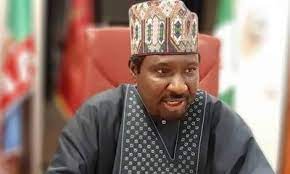 The wise resolution of a constitutional logjam by the leadership of the House of Representatives forms the thrust of this piece by ADEGBUYI AYODELE
The wise resolution of a constitutional logjam by the leadership of the House of Representatives forms the thrust of this piece by ADEGBUYI AYODELE
Like the biblical three wise men, the House of Representatives last week resorted to its ‘six wise men’ to resolve some technical but naughty issue. The muscle flexing by the Peoples Democratic Party(PDP) and the All Progressives Congress (APC) over the passage of the 2014 budget created an impasse such that the House was almost thrown into an uncontrollable crisis.
Further debate on the bill was stalled following tension already created by the warring parties. The Bill was slated for second reading on the first allotted day of Tuesday, Upon a motion and the question proposed that the Appropriation Bill be now read a second time by the Majority Leader, Hon. Mulikat Akande-Adeola, an APC lawmaker from Benue, Hon. Emmanuel Jime, rising on a point of Order, forcefully submitted that the document submitted by the Executive Arm, was not accompanied by the detailed budgets of certain government corporations as required by the provision of the Fiscal Responsibility Act.
He emphasised that rather than attach the details of the budgets of the corporations concerned as required by law, the Executive forwarded mere summaries of those budgets. Consequent upon this, the lawmaker therefore urged the House to reject the budget as laid by the Executive for non-compliance with the provisions of the law.
For fairness, the Speaker. Aminu Waziri Tambuwal invited John Enoh, Chairman, Committee on Appropriation to comment on Jime’s submissions. Responding , Enoh informed the House that the Executive Arm was not in breach of the Fiscal Responsibility Act. According to him, the budget estimates were submitted with the estimates from the relevant corporations and agencies as prescribed by the Act. He noted that the Executive Arm had always in the past, submitted summary of the estimates from the relevant agencies.
Further to this, Speaker Tambuwal came with what could be considered a masterstroke. He tactically fashioned a way out by quickly putting in place a 6-man ad hoc committee to advise on Jime’s point of order.
And in its report, the ‘six wise men’ led by Hon. Albert Sam-Tsokwa, chairman, committee on rules and business, submitted thus:: “Hon. Jime’s point of order is well founded and sustainable. However, considering the sensitive nature of the Appropriation Bill, and in deference to overriding national interest, the House of Representatives should proceed with the consideration of the 2014 Appropriation Bill, while the minister of finance (Ngozi Okonjo-Iweala) is requested to comply fully with the mandatory provisions of Section 21 of the Fiscal Responsibility Act before the conclusion (of budget consideration).”
They further contended that Section 81 of the 1999 Constitution, which requires the President to cause to be prepared and laid before the National Assembly, the Appropriation Bill, makes no requirement that the Appropriation Bill shall be accompanied by the budget estimates of any government corporation. The committee also pointed out that it was The Fiscal Responsibility Act, in its Section 21 that made it mandatory.
It said: “We are satisfied that the Act and, indeed, S.21 thereof, does not contradict the 1999 Constitution in any way. Rather S.21 of the Act only seeks to give effect and expression to the full purport and intent of S.81.
“ In other words S.81 of the Constitution and 21 of the Act are complimentary. While S.81 of the Constitution requires Mr. President to cause to be prepared and laid before the NASS the Appropriation Bill, S.21 of the Act requires that in complying with s.81 of the Constitution, the Minister should ensure that the budget estimates of some government corporations be attached to the bill,” the committee explained.
Continuing, they submitted that “We think the compliance with S.21 of the Act by the Executive is half-hearted and therefore not a sufficient compliance with the mandatory provision of section 21 (3) of the Act.”
On the argument by Hon. Enoh that the submission by the Executive Arm was in line with what they had always done in the past, the committee is of the opinion that “notwithstanding that fundamental breach in previous years, the House cannot continue on the path of error”.
The six wise men concluded that “Appropriation Bill is constitutionally imposed on the NASS by Sections 4, 59 and 81 of the 1999 Constitution. The NASS may not, under whatever guise, abdicate this all important constitutional responsibility.
“To do so is to invite chaos, anarchy and untold hardship on the citizenry who cannot, by the wildest imagination, be held contributorily negligent in the looming impasse.”
The wise resolution of the logjam opened debate on the bill with Hon. Suleiman Kawu, deputy minority leader, counseling his colleagues on the need to avoid embarking on an empty exercise.
“Mr. Speaker and honourable colleagues, here we are again. Year-in-year-out, we gather in this hallowed chamber to do a critique of money bills. This has been a legitimate tradition Nigerians now term as ‘mere rhetoric’, ‘noise without action’, and interestingly ‘empty exercise,” he added.
Citing Section 16 (2,C), which stipulates that “the state shall direct its policy towards ensuring that the economic system is not operated in such a manner as to permit the concentration of wealth or the means of production an exchange in the hands of few individuals or of a group..”, Kawu further warned that the little capital projects in the budget would bleed till another fiscal year, if government fails to meet its fiscal deficit financing plan.
“The proposals in this 2014 Appropriation Bill are in sharp contrast to this provision of the law. Despite promises to device ways of significantly increasing capital expenditure, the government had in the 2014 budget proposed to increase recurrent expenditure which has little or no impact on the lives of the people of Kano, which I represent and indeed the entire country. The proposed budget expenditure of N4.642 trillion is higher than the expected revenue of N3.731 trillion. So this budget comes with N912 billion fiscal deficit,” the lawmaker added.
In her contribution, Hon. Rafeequat Onabamiro spoke on what she described as the negative allocations to the armed forces, water resources, among others in comparison to the amnesty programme.
“With the security challenges facing the country, are we saying that the amnesty programme is more important? This showed that something is fundamentally wrong with this budget,” she queried.
Closely related was that submission from Hon. Khadija Bukar Ibrahim, who raised concern over the allocation of paltry N2 billion to the North East Development Initiatives for the entire six states in the zone while the amnesty programme was allocated such huge fund.
For Hon. Tunji Ganiyu, the allocation of over N700 billion to service the country’s debt profile was his major concern, and said: “We should be very careful and stop playing politics with our gross domestic product (GDP) by over reducing it. Our MDAs (ministries, departments and agencies) also needed to be enlightened on how to generate funds.”
Of course, the wise resolution of the logjam by the speaker deserves commendation. For the lawmakers, the tone of debate is devoid of politicking as issues, genuine issues are being raised on the contents of the appropriation bill. But as observed by Kawu, it must be such that would impact the people.



